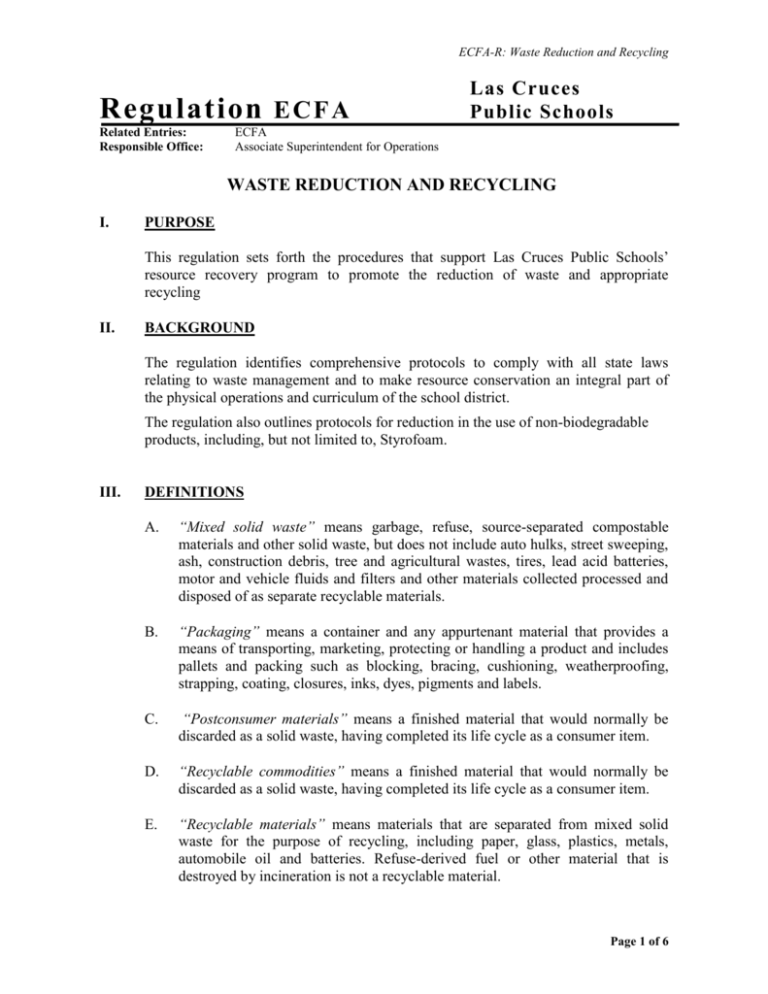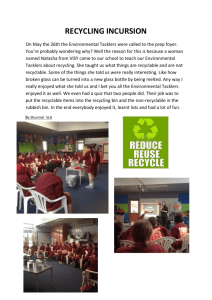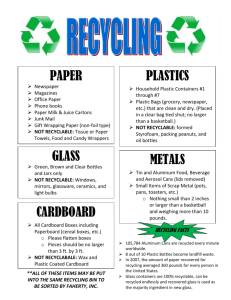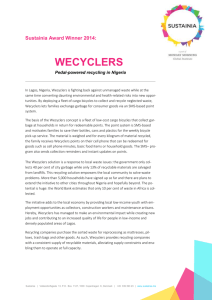ECFA-R Regulation - Las Cruces Public Schools
advertisement

ECFA-R: Waste Reduction and Recycling Regulation EC FA Related Entries: Responsible Office: Las Cruces Public Schools ECFA Associate Superintendent for Operations WASTE REDUCTION AND RECYCLING I. PURPOSE This regulation sets forth the procedures that support Las Cruces Public Schools’ resource recovery program to promote the reduction of waste and appropriate recycling II. BACKGROUND The regulation identifies comprehensive protocols to comply with all state laws relating to waste management and to make resource conservation an integral part of the physical operations and curriculum of the school district. The regulation also outlines protocols for reduction in the use of non-biodegradable products, including, but not limited to, Styrofoam. III. DEFINITIONS A. “Mixed solid waste” means garbage, refuse, source-separated compostable materials and other solid waste, but does not include auto hulks, street sweeping, ash, construction debris, tree and agricultural wastes, tires, lead acid batteries, motor and vehicle fluids and filters and other materials collected processed and disposed of as separate recyclable materials. B. “Packaging” means a container and any appurtenant material that provides a means of transporting, marketing, protecting or handling a product and includes pallets and packing such as blocking, bracing, cushioning, weatherproofing, strapping, coating, closures, inks, dyes, pigments and labels. C. “Postconsumer materials” means a finished material that would normally be discarded as a solid waste, having completed its life cycle as a consumer item. D. “Recyclable commodities” means a finished material that would normally be discarded as a solid waste, having completed its life cycle as a consumer item. E. “Recyclable materials” means materials that are separated from mixed solid waste for the purpose of recycling, including paper, glass, plastics, metals, automobile oil and batteries. Refuse-derived fuel or other material that is destroyed by incineration is not a recyclable material. Page 1 of 6 ECFA-R: Waste Reduction and Recycling F. “Recycling” means the process of collecting and preparing recyclable materials and reusing the materials in their original form that do not cause the destruction of recyclable materials in a manner that precludes further use. G. “Resource conservation” means achieving a reduction in the use of water, energy and raw materials. H. “Resource commodities” means materials, pieces of equipment, parts and used supplies which can be reused for their original purpose in their existing condition. I. “Source-separated compostable materials” means mixed solid waste that is: 1. separated at the source by waste generators for the purpose of preparing it for use as compost; 2. collected separately from other mixed municipal solid wastes; and 3. comprised of food wastes, fish and animal waste, plant materials, diapers, sanitary products and paper that is not recyclable. J. “Styrofoam,” a trademark name, means products made from extruded polystyrene foam, ubiquitously found in products such as packing materials, insulation, and foam drink cups. K. “Waste reduction” means an activity that prevents generation of waste or the inclusion of toxic materials in waste, including: 1. reusing the product in its original form; 2. increasing the life span of the product; 3. reducing material or the toxicity of material used in production or packaging; or changing procurement, consumption or waste generation habits to result in smaller quantities or lower toxicity of waste generated. L. IV. “Rechargeable battery” means a sealed nickel-cadmium battery, a sealed lead acid battery or any other rechargeable battery, except certain dry cell batteries. PROCESS WASTE DISPOSAL A. The school district will attempt whenever possible, to decrease the amount of waste-consumable materials it uses by: 1. reduction of the consumption of consumable materials; Page 2 of 6 ECFA-R: Waste Reduction and Recycling 2. full utilization of materials prior to disposal; 3. minimization of the use of non-biodegradable products, including Styrofoam, whenever practicable; and 4. When purchasing a product, giving consideration to not only the product’s purchase price, but also the product’s life-cycle cost and its recycle-disposal cost. B. Each school district facility shall have all necessary recyclable containers for appropriate collection. C. The school district shall cooperate with and participate in, recycling programs initiated by the city and/or county where the school district is located. D. No school district employee or volunteer, nor any contractor or his/her employee working on behalf of the school district, shall knowingly place motor oil, brake fluid, power steering fluid, transmission fluid, motor oil filters or motor vehicle antifreeze (other than small amounts of antifreeze contained in water used to flush the cooling system of a vehicle after the antifreeze has been drained and does not include de-icer that has been used on the exterior of a vehicle) in or on: 1. solid waste or solid waste management facilities other than a recycling facility or household hazardous waste collection facility; 2. any open land; 3. the waters of the state, an individual sewage treatment system or in a storm water or waste water collection or treatment system. E. No school district employee or volunteer, nor any contractor or his/her employee working on behalf of the school district, shall knowingly place mercury or the thermostat, thermometer, electric switch, appliance, gauge, medical or scientific instrument, fluorescent or high-intensity discharge lamp, electric relay or other electrical devise from which the mercury has not been removed for reuse or recycling: 1. in a solid wasted processing facility; or 2. in a solid waste disposal facility. F. No school district employee or volunteer, nor any contractor or his/her employee working on behalf of the school district, shall place a lead acid battery in mixed municipal solid waste or dispose of a lead acid battery. Nor shall any school district employee or volunteer, nor any contractor or his/her employee working on behalf of the school district, shall place in mixed municipal solid waste a dry cell battery containing mercuric oxide electrode, silver oxide electrode, nickelPage 3 of 6 ECFA-R: Waste Reduction and Recycling cadmium or sealed lead-acid that was purchased for use or used by the school district. Nor shall any school district employee or volunteer, nor any contractor or his/her employee working on behalf of the school district, shall place in mixed municipal solid waste a rechargeable battery, a rechargeable battery pack, a product with a non-removable rechargeable battery or a product powered by rechargeable batteries or rechargeable battery pack, from which all batteries or battery packs have not been removed. G. No school district employee or volunteer, nor any contractor or his/her employee working on behalf of the school district, shall place yard waste: 1. in mixed municipal solid waste; 2. in a disposal facility; or 3. in a resource recovery facility, except for the purpose of reuse, composting or co-composting. H. No school district employee or volunteer, nor any contractor or his/her employee working on behalf of the school district, shall place a telephone directory: 1. in solid waste; 2. in a disposal facility; or 3. in a resource recovery facility, except a recycling facility. I. No school district employee or volunteer, nor any contractor or his/her employee working on behalf of the school district, shall: 1. place major appliances in mixed municipal solid waste; or 2. dispose of major appliances in or on the land or in a solid waste processing or disposal facility. PROCUREMENT OF RECYCLED COMMODITIES AND MATERIALS A. When practicable and in compliance with state and local procurement statutes, regulations and policies, the school district shall purchase and use recycled and/or biodegradable materials. In order to maximize the quantity and quality of recycled material purchased, the school district may also use other appropriate procedures to acquire recycled materials at the most economical cost to the school district. B. When purchasing commodities and services, the school district shall apply and promote waste management practices with emphasis on the reduction of the quantity and toxicity of materials in waste. Page 4 of 6 ECFA-R: Waste Reduction and Recycling C. Whenever practicable, and in compliance with the operational requirements of the school district, the school district shall: 1. purchase the following types of paper: a. uncoated office paper and printed paper unless the coating of paper is made with at least 10 percent postconsumer material; b. recycled content paper with at least 10 percent postconsumer material by weight; c. paper which has not been dyed with colors, excluding pastel colors; d. recycled content paper that is manufactured using little or no chlorine bleach or coloring derivatives; D. 2. use no more than two colored inks, standard or processed, except in formats where they are necessary to convey meaning; 3. use reusable binding materials or staples and bind documents by methods that do not use glue; 4. produce reports, publications and periodicals that are readily recyclable; 5. print documents on both sides of each page where commonly accepted publishing practices allow; and 6. purchase copier paper that contains at least 10 percent post-consumer material by fiber content. In developing bid specifications, the school district will consider the extent to which a commodity or product is durable, biodegradable, reusable or recyclable and marketable through applicable local or regional recycling programs and the extent to which the commodity or product contains postconsumer material. 1. The school district shall request of vendors and suppliers, public and private, to provide products that are recyclable and/or biodegradable. E. V. When a project involves the replacement of carpeting, the school district may require all persons who wish to bid on the project to designate a carpet recycling company in their bids. EVALUATION A. The Superintendent shall delegate to the Associate Superintendent for Operations, the responsibility to track the use of reusable, recyclable and/or biodegradable products for the purpose of evaluating costs and/or use of recyclable and biodegradable materials. Page 5 of 6 ECFA-R: Waste Reduction and Recycling B. The Superintendent shall share trend reports with the Board of Education, when applicable. History: New regulation, created 02.09.11; rewrite 3.17.11 Legal Reference: Associate Superintendent for Operations May 26, 2011 Date Approved Page 6 of 6





